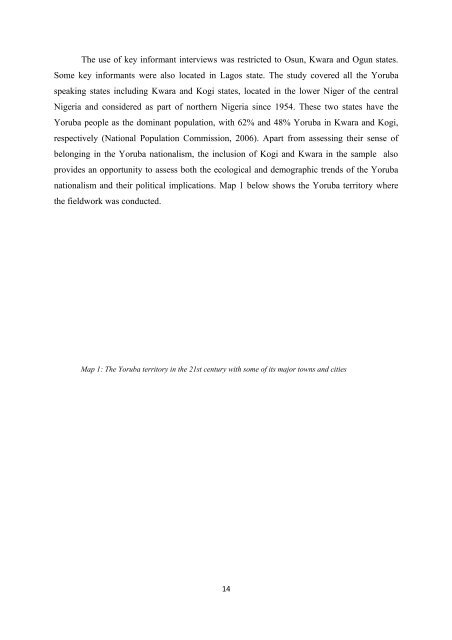The Yoruba Nationalist Movements, Ethnic Politics and Violence: A ...
The Yoruba Nationalist Movements, Ethnic Politics and Violence: A ...
The Yoruba Nationalist Movements, Ethnic Politics and Violence: A ...
Create successful ePaper yourself
Turn your PDF publications into a flip-book with our unique Google optimized e-Paper software.
<strong>The</strong> use of key informant interviews was restricted to Osun, Kwara <strong>and</strong> Ogun states.<br />
Some key informants were also located in Lagos state. <strong>The</strong> study covered all the <strong>Yoruba</strong><br />
speaking states including Kwara <strong>and</strong> Kogi states, located in the lower Niger of the central<br />
Nigeria <strong>and</strong> considered as part of northern Nigeria since 1954. <strong>The</strong>se two states have the<br />
<strong>Yoruba</strong> people as the dominant population, with 62% <strong>and</strong> 48% <strong>Yoruba</strong> in Kwara <strong>and</strong> Kogi,<br />
respectively (National Population Commission, 2006). Apart from assessing their sense of<br />
belonging in the <strong>Yoruba</strong> nationalism, the inclusion of Kogi <strong>and</strong> Kwara in the sample also<br />
provides an opportunity to assess both the ecological <strong>and</strong> demographic trends of the <strong>Yoruba</strong><br />
nationalism <strong>and</strong> their political implications. Map 1 below shows the <strong>Yoruba</strong> territory where<br />
the fieldwork was conducted.<br />
Map 1: <strong>The</strong> <strong>Yoruba</strong> territory in the 21st century with some of its major towns <strong>and</strong> cities<br />
14

















